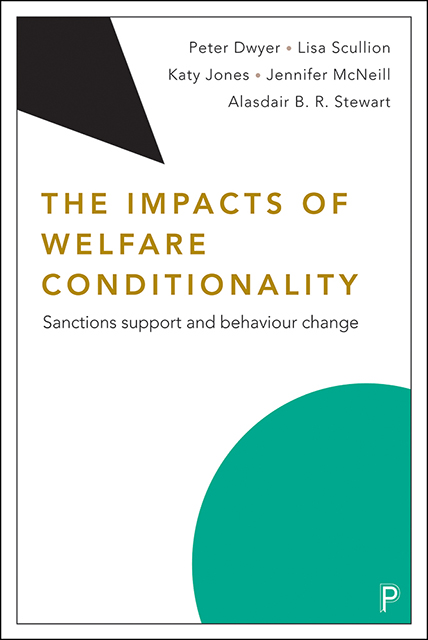Book contents
- Frontmatter
- Contents
- List of figures and tables
- List of abbreviations
- About the authors
- Acknowledgements
- One Introduction
- Two Conditionality in the UK welfare state
- Three Welfare conditionality and behaviour change
- Four From welfare to work? The effectiveness of welfare conditionality in moving people into paid employment
- Five Welfare conditionality and problematic or antisocial behaviour
- Six Unintended outcomes? The wider impacts of compulsion and benefit sanctions in social security
- Seven Ethical debates
- Eight Conclusions
- Methods appendix
- References
- Index
Methods appendix
Published online by Cambridge University Press: 17 June 2023
- Frontmatter
- Contents
- List of figures and tables
- List of abbreviations
- About the authors
- Acknowledgements
- One Introduction
- Two Conditionality in the UK welfare state
- Three Welfare conditionality and behaviour change
- Four From welfare to work? The effectiveness of welfare conditionality in moving people into paid employment
- Five Welfare conditionality and problematic or antisocial behaviour
- Six Unintended outcomes? The wider impacts of compulsion and benefit sanctions in social security
- Seven Ethical debates
- Eight Conclusions
- Methods appendix
- References
- Index
Summary
Introduction
As noted in Chapter One, the use of conditional welfare arrangements which aim to influence the behaviour of social welfare recipients has become an established and expanding feature of UK welfare state provision over the last three decades. Against this backdrop the WelCond project (2013–19) had three core aims. First, to develop an empirically and theoretically informed understanding of the role of welfare conditionality in promoting and sustaining behaviour change among a diversity of social welfare recipients over time. Second, to consider the particular circumstances in which the use of welfare conditionality may, or may not, be ethically justified. Third, to establish an original and comprehensive evidence base on the efficacy and ethicality of conditionality across a range of social policy fields and diverse groups of welfare service users (WSUs).
A qualitative approach
Essentially the WelCond project team were attempting to explore and understand a number of linked questions about the fairness, impacts and effects, intended or otherwise, of welfare interventions underpinned by, and delivered according to, a principle of welfare conditionality. To do this we used a range of appropriate qualitative methods (see, for example, Ritchie et al, 2014; Mason, 2017). Initially, a comprehensive literature review and mapping of theoretical and normative positions related to welfare conditionality and behaviour change was undertaken alongside a rapid review of existing quantitative datasets appropriate to the various sampled populations under consideration within the project. A series of cross-disciplinary seminars convened with expert international speakers also informed the early theoretical work of the WelCond team.
To allow for a comparison of how differing legislative frameworks and political approaches might impact on the implementation and effectiveness of welfare conditionality we chose to undertake our fieldwork in England and Scotland. Before embarking on extensive qualitative fieldwork a series of consultation workshops were then undertaken with practitioners (involved in policy formation and the implementation of welfare conditionality) and WSUs. Subsequently, in order to generate new empirical data to inform our work, we undertook interviews with three sets of respondents. First, the team conducted 52 semi-structured interviews with policy stakeholders (including policymakers, senior officers from government, service provider agencies, umbrella bodies and campaigning organisations).
- Type
- Chapter
- Information
- The Impacts of Welfare ConditionalitySanctions Support and Behaviour Change, pp. 161 - 168Publisher: Bristol University PressPrint publication year: 2022

